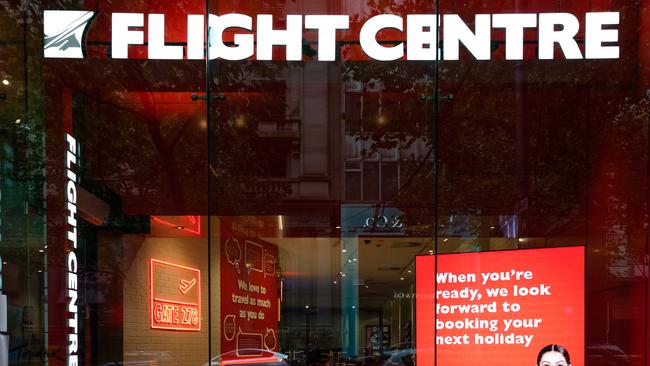
Flight Centre’s $700m equity raising will likely help Australia’s largest travel agency chain to survive for about 20 months at least with COVID-19 disruptions and position it strongly for the future, according to analysts from Citi.
Flight Centre, which has seen much of its business halted by coronavirus disruptions, announced to the market it would secure $419m through a one for 1.74 entitlement offer and $282m through a placement.
The highly dilutive raising, conducted through UBS, Macquarie Capital and Luminis Partners, sees shares sold at $7.20, compared to the last closing price of $9.91 on March 19, representing a 27.3 per cent discount.
The group said it had also sourced $200m of additional bank debt and would move on $60m worth of asset sales.
Flight Centre further announced Monday that it would slash costs by $1.9bn and close half of its stores internationally.
Citi analysts said in a research note that the group now had $960m of additional capital to extend its liquidity buffers.
Citi says the cost savings would limit the group’s cash burn to about $65m per month and the company’s operating cost base would shrink by over 70 per cent.
This was being driven by a 69 per cent reduction in wages, a 52 per cent reduction in rent and a 93 per cent fall in sales and marketing costs.
“At a $65 million cash burn rate, Flight Centre appears to have up to 20 months of liquidity,” the analysts said.
“While this appears conservative, we consider the nature of working capital unwind and risks on converting debtors to cash as key unknown factors, which could reduce the liquidity buffer.”
Citi warns that given the scale of the crisis in the travel industry, there was elevated risk around the magnitude of debts across retail and corporate of $543m, along with other debts.
But they say that a leaner cost base is needed for Flight Centre to remain competitive in the long term.
The closure of more than half its stores will drive rent and wage savings.
“The crisis has forced a much-needed shift in the business, away from bricks and mortar stores,” the analysts said.
“A leaner cost base is essential for Flight Centre to remain competitive long term.”
The analysts believed that the liquidity injection appeared sufficient to weather the industry-wide pressures of COVID-19.
They added that risk remained around working capital, but that the reduction in costs positioned Flight Centre to emerge in a stronger competitive position once COVID-19 disruption eased.






To join the conversation, please log in. Don't have an account? Register
Join the conversation, you are commenting as Logout